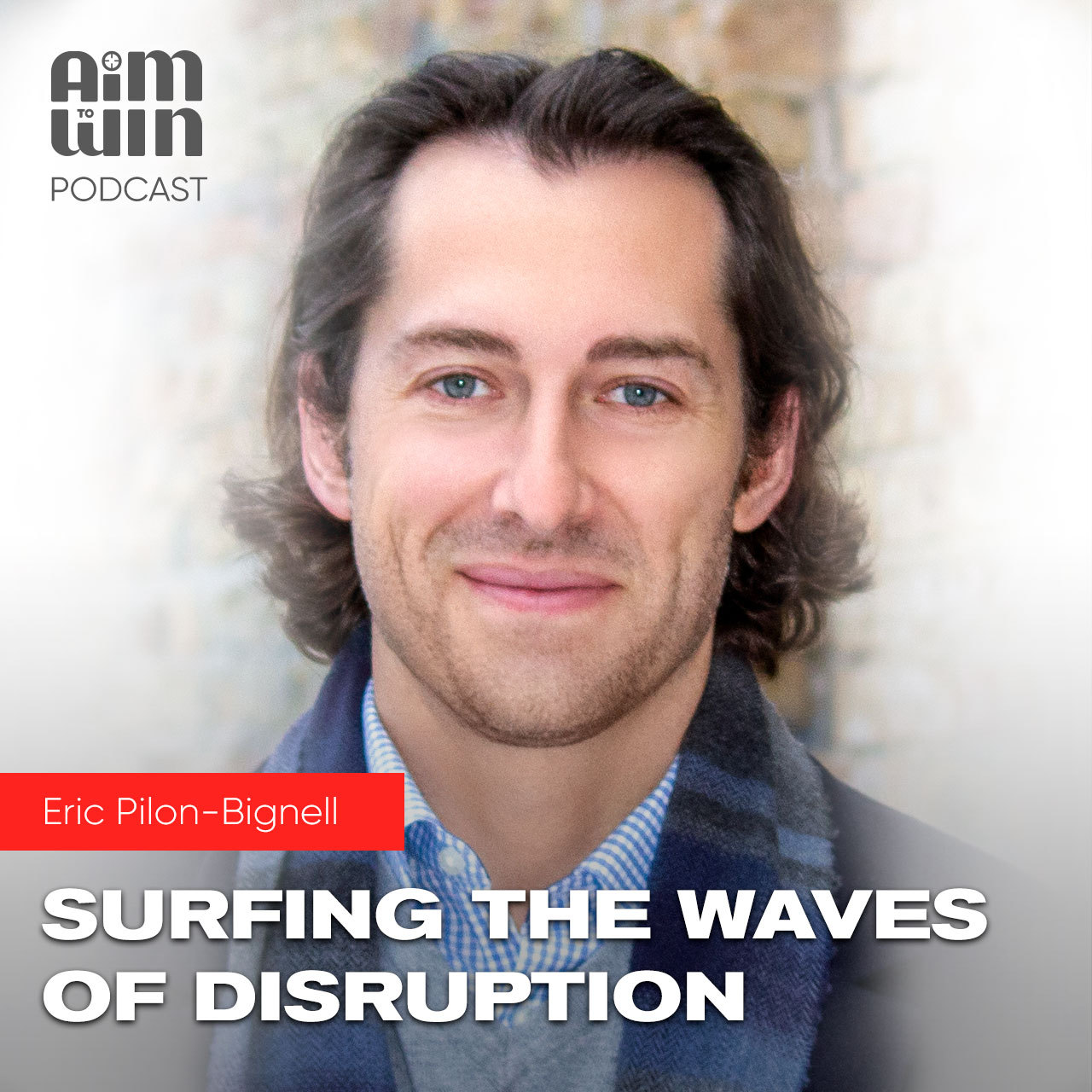Listen to the episode right here.
Eric Pilon-Bignell is a best selling author, speaker, and pragmatic futurist. Eric grew up just south of Toronto, Canada. His recent book, Surfing Rogue Waves released on May 25th. The book presents a gripping and insightful framework on how to pick up a board and surf the rogue waves of the 21st century. Eric’s love of being active and outdoors led him to use the parallels between life and surfing as a metaphor for how we can deal with the changes happening around us.
Eric is a pragmatic futurist focused on addressing disruption by increasing the creative capacity of individuals, teams, and organizations to ignite change, innovation, and foster continuous growth.
Eric has an undergraduate degree in engineering, an MBA in Information Systems, and a Ph.D. in Global Leadership. His doctoral work primarily explored complexity sciences centered on executive cognition and their use of intuitive improvisation, decision-making, artificial intelligence, and data-based decision models.
Eric founded PROJECT7, an initiative to raise awareness and money for research on brain-related illnesses. When he is not working with clients, researching, or writing, he can be found in the mountains or on the water. Eric is currently working and living with his wife and dog in Chicago, Illinois.
Podcast Highlights
Who is Eric Pilon-Bignell?
Eric was formally in Engineering and Information and Systems Technology. He started off professionally as an engineer and has since moved into working with clients and management as a consultant. His experiences led him to pursue an answer to the question of “why don’t we notice change as it happens?”.
Eric’s Ph.D. thesis developed into the larger ideas he wrote up in his book on how to surf the complexities that society is facing over the coming years.
What are some of the disruptions that are happening right now?
Exponential changes are on the way, and those changes are making the usual linear ways of thinking obsolete. In the pursuit of trying to get better at everything and better understand the world around us, technology is disrupting and changing the way that the world works and the way systems interact with each other. The challenge we’re facing is that we can’t rely on the map that has gotten us to where we are now.
Technologies like CRISPR are leading to incredible breakthroughs in solving health problems, but they also create questions around ethics and what we, as a society, want to be. Technology is only one aspect of the coming changes, the real disruption is happening at a human level.
Controlling the Future
Leaders often try to control the future and direct how things are going to happen. This is where the metaphor of surfing comes in. You can’t control the wave, but you can control your actions in relation to the wave.
Leaders need to take action because the complexity is too great to grasp to make a fully informed decision. It’s by engaging the complexity that we can identify where we want to be and how to manage it. Going forward, navigating the complexity is how organizations will grow.
Complexity is made up of interactions, emergence, dynamics, self-organization, and adaptation. Our instinct is to take things and put them into silos in order to understand them, but that doesn’t work with complexity. From a pragmatic worldview, leaders have no choice but to be interested in the emergence as a way to better understand the future.
Leaders need to embrace uncertainty and complexity and become comfortable in a more chaotic environment. Growth happens in the uncomfortable tension between chaos and order, just like surfing a big wave.
Preparing for the Future
We want to use technology to make things easier and faster and more efficient, but ultimately we have to look inwards. Our decisions ultimately define who we become and that extends to the decisions we make when leading a team or an organization.
We can’t anticipate everything that happens and leaders have to be comfortable with uncertainty and questioning a lot of the underlying assumptions we’ve been relying on. If the assumption doesn’t map to the results in the real world, we need to be prepared to leave that assumption behind.
Future leaders need to adopt a mindset of challenging their own beliefs and testing themselves. As organizations, we need to challenge everything and be okay with being challenged. One of the greatest challenges we are currently facing is not technology, but the beliefs that we hold so closely that to question them is threatening to our very identity.
Links:
https://www.linkedin.com/in/ericpilonbignell/

